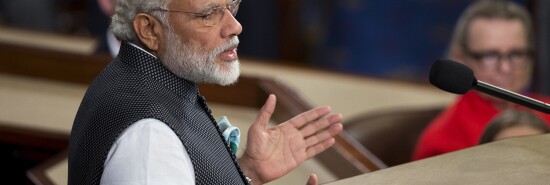
Don’t give India the Saudi treatment
Michael Rubin
President Joe Biden‘s national security team is increasingly uneasy with Indian Prime Minister Narendra Modi. The two have little in common. Biden and his top aides are overwhelmingly irreligious. Modi, though, is a devout Hindu. Biden considers himself an orator; Modi is one. And, while Biden sees himself as an effete intellectual, Modi is a populist. Perhaps this is the root of the problem. Biden and his progressive base continue to blame Modi for the 2002 Gujarat riots in which more than 1,000 mostly Muslim Indians perished.
While the Pentagon increasingly seeks to further its partnership with India, especially against the backdrop of the looming China threat, many progressive commentators are increasingly uneasy with Modi. “How Long Will Joe Biden Pretend Narendra Modi’s India Is a Democratic Ally” one Time article asked. “Modi’s Hindu nationalism and his country’s backsliding on human rights and democracy are creating a problematic alliance for President Joe Biden,” Politico reported.
DESPITE BIDEN’S WEIRD ECONOMIC BOASTS, HIS POLICIES HAVE MADE THINGS WORSE
U.S. reporters pressure the White House to comment on Muslim grievances inside India, and Biden himself has said that, as a “straight-shooter,” he will raise the issue with Modi. A recent BBC documentary about Modi’s early years and his alleged embrace of Hindu supremacy has further centered Modi as a target for progressives. Such criticism will continue to accelerate ahead of a planned Modi state visit to the White House. It may be tempting for Biden’s team to virtue signal and criticize Modi.
There is much to criticize.
Freedom House has documented alleged abuses. Reporters Without Borders has been less careful: the idea that India’s press freedom is below Turkey’s reflects animus more than methodology and is more ironic given American journalists’ partisanship and co-option by the Biden administration. That said, Modi is the elected leader of the world’s largest democracy and even the State Department, which accuses the Indian government under his administration of human rights abuses, acknowledges that India’s elections are free and fair.
It is essential Biden continue to see the big picture and not repeat his Saudi Arabia mistakes.
India’s economy, meanwhile, continues to grow at a pace that even Pakistani commentators consider a model. Against the backdrop of progressive pressure, however, the White House personalized American relations with Saudi Arabia. As a candidate, Biden criticized Saudi Crown Prince Muhammed bin Salman and called Saudi Arabia a “pariah.” He repeatedly gave the crown prince the cold shoulder until rising oil prices and inflation refocused the White House on the importance of America’s 75-year partnership with the oil-rich kingdom. It was too little, too late.
Gratuitously targeting allies and moralistic pearl-clutching to appease domestic activists has a cost.
For too long after India’s partition, the U.S. and India had an antagonistic relationship. For this, there was enough blame to go around. India sought to lead the non-aligned movement but leaned toward the Soviet sphere. Rebuffed by Prime Minister Jawaharlal Nehru, President Harry S. Truman pivoted to Pakistan. Secretary of State Henry Kissinger gratuitously threw India under the bus in order to cultivate Communist China. The George W. Bush administration, however, sought to recalibrate relations and found a willing partner. Developing Indo-American ties became a bipartisan project.
Reactionary forces in both China and Pakistan seek to undermine the further blossoming of relations. Both Beijing and Islamabad cultivate proxies in the United States and Canada to criticize India and impede ties. While it is fair for Washington to criticize excesses and elements of Indian policy, just as it is right for New Delhi to do likewise with the United States, it would be wrong to gratuitously criticize the Indian government for sins real or imagined to appease fringe obsession.
CLICK HERE TO READ MORE FROM THE WASHINGTON EXAMINER
The White House must learn from its mistakes. Too much is at stake and, frankly, just as with Saudi Arabia, the United States may soon find it needs India more than India needs the United States.
Michael Rubin (@mrubin1971) is a contributor to the Washington Examiner’s Beltway Confidential. He is a senior fellow at the American Enterprise Institute.
